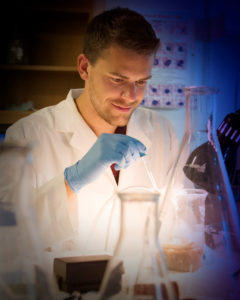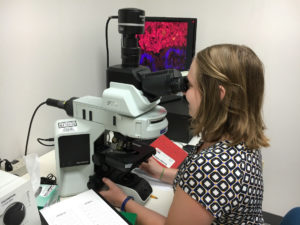Student Researchers Tackle Societal Issues
What program combined public health, environmental health, and animal health to answer two research societal needs? Two Texas A&M students, Clara Bush (veterinary student), and Jarius Pulczinski (graduate student), participated in the thirteen-week on- campus summer Veterinary Medical Scientist Research Training Program (VMSRTP)(https://vetmed.tamu.edu/vmsrtp).
Their scholarships were sponsored by the Texas A&M One Health Initiative. Each student was provided the opportunity to address a societal need, conduct hands-on research and identify One Health solutions working alongside accomplished faculty mentors. The students analyzed and presented their individual research findings at the Veterinary Medical Scientist Research Training Program Research Conference (https://vetmed.tamu.edu/vmsrtp/about-the-vmsrtp/research-conference) and the Merial-NIH National Veterinary Scholars Symposium ( http://www.merialscholars.com/Pages/national-symposium2016.aspx) at The Ohio State University

Jarius, a public health MS graduate student, was mentored by Dr. Natalie Johnson (https://sph.tamhsc.edu/eoh/faculty/johnson.html), an assistant professor in the Environmental and Occupational Health Department at the Texas A&M School of Public Health. Jarius’s research examined the relationship between air pollution exposure and health outcomes in humans and mice. Dr. Johnson explained that Jairus, “compared data from a mouse model of prenatal air pollution exposure-induced asthma and from a maternal exposure characterization study in a population with high rates of childhood asthma. He measured inflammatory markers reflective of maternal air pollution exposure in human and mouse samples to investigate the link between maternal inflammation and asthma susceptibility.” Dr. Johnson observed that this summer the program led to new insights about opportunities at the interface of human and animal research.

Clara, a second-year veterinary student, was mentored by Dr. Raquel Rech (https://vetmed.tamu.edu/vtpb/directorydetail?userid=12806), a clinical assistant professor in the Department of Veterinary Pathobiology at Texas A&M University. Clara’s research will ultimately impact the creation of a pig model to study Environmental Enteropathy, a Gastrointestinal (GI) disease in humans. “I worked to determine what tissue fixative best preserved the mucous layer of the colon in pig colonic samples,” Clara explained about her research “In the future, the use of optimal tissue handling and fixation will be an important aid in the further discovery of more targeted treatments and therapies for GI disease in veterinary medicine and human medicine alike.”
Clara’s response to this experience was, “Overall the program was a confidence booster for me, as a person who had never been on the presenting end of a scientific research project. It gave me the push to explore other career options and opportunities that I might not have known about.” She added, “This program was such a great way to break into the field of veterinary medicine which truly exemplifies a collaborative effort. Not only was I able to gain valuable laboratory skills that I can take with me far beyond veterinary school, but I was also able to get a first-hand look at the way the “One Health” concept works in real life.”
Information about One Health student programs and opportunities are available through the Texas A&M One Health Initiative (http://onehealth.tamu.edu).


